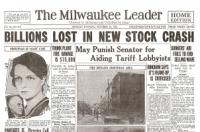|
|
|
| Read more about Al Capone by clicking here |

FIND OUT WHAT THE WORLD WAS LIKE IN 19...(after reading about the year of your Model A, simply click
the arrow on the upper left hand corner of your screen. That will take you back to our website)
After reading about your favorite year, just click on the left arrow on the upper left hand side of
the screen to return to this page.
1928
1929
1930
1931
| HERBERT HOOVER 31st President of The United States |
|
|
| Read more about Herbert Hoover by clicking here |
| CALVIN COOLIDGE 30th President of the U.S.A. |
|
|
| Read more about Calvin Coolidge by clicking here |
John Calvin Coolidge, Jr. (July 4, 1872 – January 5, 1933) was the 30th President of the United States (1923–1929). A Republican lawyer from Vermont, Coolidge worked his way up the ladder of Massachusetts state politics, eventually becoming governor of that state. His actions during the Boston Police Strike of 1919 thrust him into the national spotlight. Soon after, he was elected as the 29th Vice President in 1920 and succeeded to the Presidency upon the death of Warren G. Harding. Elected in his own right in 1924, he gained a reputation as a small-government conservative.
Coolidge restored public confidence in the White House after the scandals of his predecessor's administration, and left office with considerable popularity. As his biographer
later put it, "he embodied the spirit and hopes of the middle class, could interpret their longings and express their opinions. That he did represent the genius of the average
is the most convincing proof of his strength." Many later criticized Coolidge as part of a general criticism of laissez-faire government. His reputation underwent a renaissance during the Ronald Reagan Administration, but the ultimate assessment of his presidency is still divided between those who approve
of his reduction of the size of government and those who believe the federal government should be more involved in regulating
and controlling the economy.
Herbert Clark Hoover (August 10, 1874 – October 20, 1964) was the 31st President of the United States (1929–1933). Besides his political career, Hoover was a professional mining engineer and author. As the United States Secretary of Commerce in the 1920s under Presidents Warren Harding and Calvin Coolidge, he promoted government intervention under the rubric "economic modernization". In the presidential election of 1928, Hoover easily won the Republican nomination, despite having no previous elected office experience. To date, Hoover is the last cabinet secretary
to be directly elected President of the United States. The nation was prosperous and optimistic at the time, leading to a
landslide victory for Hoover over Democrat Al Smith.
Hoover deeply believed in the Efficiency Movement (a major component of the Progressive Era), arguing that a technical solution existed for every social and economic problem. That position was
challenged by the Wall Street Crash of 1929 that took place less than eight months after his taking office, and the Great Depression that followed it which gained momentum in 1930. Hoover tried to combat the Depression with volunteer
efforts and government action, none of which produced economic recovery during his term. The consensus among historians is
that Hoover's defeat in the 1932 election was caused primarily by failure to end the downward economic spiral, compounded by popular opposition
to prohibition. Other electoral liabilities were Hoover's lack of charisma in relating to voters, and his poor skills
in working with politicians. As a result of these factors, Hoover is typically ranked very poorly among former U.S. presidents.

|
| Click here to read more about the stocl market crash of 1929 |
The Wall Street Crash of 1929, also known as the Great Crash or the Stock Market Crash
of 1929, was the most devastating stock market crash in the history of the United States, taking into consideration the full extent and duration of its fallout.
Four phases—Black Thursday, Black Friday, then Black Monday, and Black
Tuesday—are commonly used to describe this collapse of stock values. All four are appropriate, for the crash was
not a one-day affair. The initial crash occurred on Thursday, October 24, 1929, but the catastrophic downturn of Monday, October
28 and Tuesday, October 29 precipitated widespread alarm and the onset of an unprecedented and long-lasting economic depression
for the United States and the world.
|
|
In the history of the United States, Prohibition, also known as The Noble Experiment, is the period from 1919 to 1933,
during which the sale, manufacture, and transportation of alcohol for consumption were banned nationally as mandated in the Eighteenth Amendment to the United States Constitution.
Under substantial pressure from the temperance movement, the United States Senate proposed the Eighteenth Amendment on December 18, 1917. Having been approved by 36 states, the 18th
Amendment was ratified on January 16, 1919 and effected on January 16, 1920. Some state legislatures had already enacted statewide
prohibition prior to the ratification of the 18th Amendment.
The "Volstead Act", the popular name for the National Prohibition Act, passed through Congress over President Woodrow Wilson's veto on October 28, 1919 and established the legal definition of intoxicating liquor. Though the Volstead
Act prohibited the sale of alcohol, it did little to enforce the law. The illegal production and distribution of liquor, or
bootlegging, became rampant, and the national government did not have the means or desire to enforce every border, lake, river,
and speakeasy in America. In fact, by 1925 in New York City alone there were anywhere from 30,000 to 100,000 speakeasy clubs.
Prohibition became increasingly unpopular during the Great Depression, especially in large cities. On March 23, 1933, President Franklin Roosevelt signed into law an amendment to the Volstead Act known as the Cullen-Harrison Act, allowing the manufacture
and sale of certain kinds of alcoholic beverages.
On December 5, 1933, the ratification of the Twenty-first Amendment repealed the Eighteenth Amendment
|
 |
|
|
 |
|
|
 |
|
|
|

